初三英语总复习单词、词组训练
人教版九年级英语全一册 Unit5 总复习 练习题教学课件PPT初三公开课

英语·人教版·九年级全一册 ·UNIT5What are the shirts made of?一、根据汉语或首字母提示写出单词1.[2020江苏镇江中考] The old couple have two sons and both of them are (邮递员).2.Visitors to Yangzhou can enjoy a bite of (当地的) dishes at Yechun Teahouse.3. [2020四川德阳中考] People prefer to wear T-shirts made of c in summer because they make people feel more comfortable.1.postmen 主语both of them表示复数,postman为可数名词,意为"邮递员",其复数形式为postmen。
2.local 句意:到扬州的游客可以在冶春茶社品尝当地的菜肴。
3.cotton 句意:人们喜欢在夏天穿由棉制成的T恤,因为它们让人感觉更舒服。
cotton为不可数名词,意为"棉;棉花"。
4. [2020四川眉山中考] In autumn, l fall down and it makes an amazing scene.5.When the t lights are red, we must stop crossing the road.4.leaves 句意:在秋天,树叶落下,这形成了一个令人惊叹的景象。
leaf为可数名词,意为"树叶", 由空后的fall可知空处应用其复数形式leaves。
5.traffic 句意:当交通灯是红色的时候,我们必须停止横穿马路。
二、 用所给单词的适当形式填空1.Please be careful.The bottle is made of (glass). It’s easy to break.2.[热点素材][2020江苏泰州中考]—Could you tell me what the sign means?—Keep distance in public places to avoid (catch) a virus.3.[热点素材] Because of COVID- 19,families and friends are strongly advised to use serving (chopstick) and spoons when eating together.1.glass 句意:请小心。
初三英语复习必背词组和句型
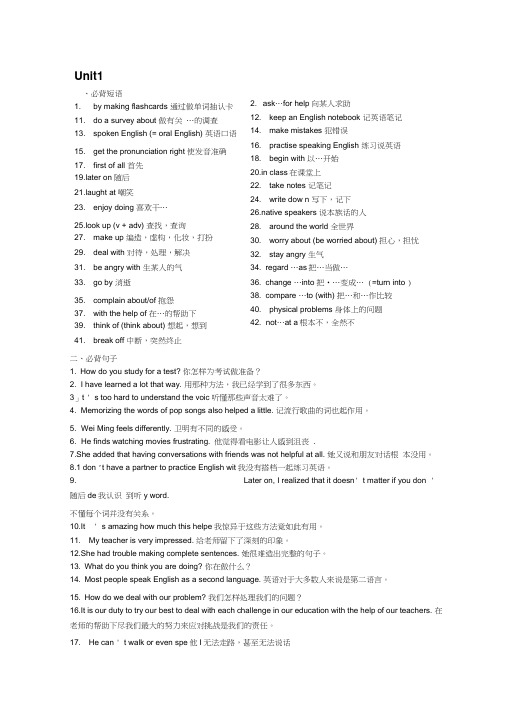
Unit1、必背短语1. by making flashcards 通过做单词抽认卡11. do a survey about 做有关…的调查13. spoken English (= oral English) 英语口语15. get the pronunciation right 使发音准确17. first of all 首先ter on 随后ught at 嘲笑23. enjoy doing 喜欢干…25.look up (v + adv) 查找,查询27. make up 编造,虚构,化妆,打扮29. deal with 对待,处理,解决31. be angry with 生某人的气33. go by 消逝35. complain about/of 抱怨37. with the help of 在…的帮助下39. think of (think about) 想起,想到41. break off 中断,突然终止2. ask…for help向某人求助12. keep an English notebook 记英语笔记14. make mistakes 犯错误16. practise speaking English 练习说英语18. begin with 以…开始20.in class在课堂上22. take notes 记笔记24. write dow n 写下,记下26.native speakers 说本族话的人28. around the world 全世界30. worry about (be worried about) 担心,担忧32. stay angry 生气34. regard …as把…当做…36. change …into 把•…变成… (=turn into ) 38. compare …to (with) 把…和…作比较40. physical problems 身体上的问题42. not…at a根本不,全然不二、必背句子1. How do you study for a test? 你怎样为考试做准备?2. I have learned a lot that way. 用那种方法,我已经学到了很多东西。
初三英语重点词组短语
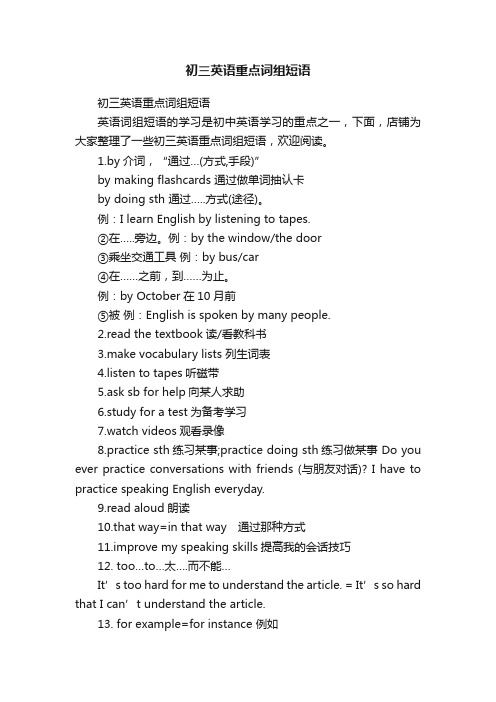
初三英语重点词组短语初三英语重点词组短语英语词组短语的学习是初中英语学习的重点之一,下面,店铺为大家整理了一些初三英语重点词组短语,欢迎阅读。
1.by介词,“通过…(方式,手段)”by making flashcards 通过做单词抽认卡by doing sth 通过…..方式(途径)。
例:I learn English by listening to tapes.②在…..旁边。
例:by the window/the door③乘坐交通工具例:by bus/car④在……之前,到……为止。
例:by October在10月前⑤被例:English is spoken by many people.2.read the textbook读/看教科书3.make vocabulary lists 列生词表4.listen to tapes听磁带5.ask sb for help向某人求助6.study for a test为备考学习7.watch videos观看录像8.practice sth练习某事;practice doing sth练习做某事 Do you ever practice conversations with friends (与朋友对话)? I have to practice speaking English everyday.9.read aloud朗读10.that way=in that way 通过那种方式11.improve my speaking skills提高我的会话技巧12. too…to…太….而不能…It’s too hard for me to understand the article. = It’s so hard that I can’t understand the article.13. for example=for instance 例如14. ask about询问有关…;ask sb about sth向某人询问/打听有关…. We asked them about the best ways to learn more English.I want to ask about the use of the new machines.15. watch/see/hear sb do sth观看/看见/听见某人做过某事;watch/see/hear sb doing sth观看/看见/听见某人正在做某事 He can watch actors say the words. Can you hear him singing in the room?16. 辨析:sometime ;sometimes ;some times ;some time①s ometime在将来/过去的某一时间I’ll speak to him about it sometime. 我会找个时间和他谈谈这事. I met her sometime last year.去年的某个时候我见过她. ② sometimes = at times有时,偶尔It is sometimes hot and sometimes cold here. He sometimes writes to me. ③some time A.一些时间:It will take you some time to walk there. B.在未来的某时=sometime: Phone me some time next week下个星期什么时候给我打电话吧. ④some times一些次,几次 I've told him the thing some times.17. join短语:①join sb加入到某人的活动中去②join in+活动项目"参加…活动" I'd like to join in the game. ③join+组织机构"加入到某个组织机构,成为其中的一个成员"join the Party; join the League, The best way to improve your English is to join an English club18. have fun 玩得高兴19. not at all 一点也不20. get excited 高兴、激动21. end up (vi.) 结束; 告终; 结果 ; 最后end up doing sth.We end up taking a taxi there .我们结果乘出租车去了那里. We sometimes end up speaking in Chinese.(以说汉语结束对话)22. do a survey 做调查;do a survey about针对…做调查I'm doing a survey about learning English. 我在进行学习英语的调查。
【初三必备】中考英语高频词汇(单词)
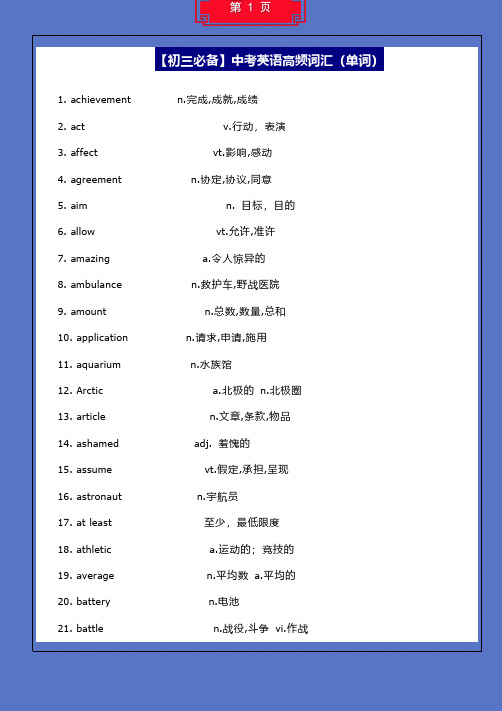
【初三必备】中考英语高频词汇(单词)1.achievement n.完成,成就,成绩2.act v.行动,表演3.affect vt.影响,感动4.agreement n.协定,协议,同意5.aim n.目标,目的6.allow vt.允许,准许7.amazing a.令人惊异的8.ambulance n.救护车,野战医院9.amount n.总数,数量,总和10.application n.请求,申请,施用11.aquarium n.水族馆12.Arctic a.北极的n.北极圈13.article n.文章,条款,物品14.ashamed adj.羞愧的15.assume vt.假定,承担,呈现16.astronaut n.宇航员17.at least至少,最低限度18.athletic a.运动的;竞技的19.average n.平均数a.平均的20.battery n.电池21.battle n.战役,斗争vi.作战22.blame vt.责备,把…归咎于23.blind a.瞎的,盲目的24.bloodshed n.流血事件25.bomb v.轰炸n.炸弹26.bother v.打扰27.breathe v.呼吸28.bully n./v.欺负29.cage n.笼,鸟笼,囚笼30.calculation n.计算31.camera n.照相机,摄影机32.cancel v.取消33.cancer n.癌,癌症34.captive/caged adj.俘虏的,捕获的35.captivity n.囚禁,被关36.cause n.原因,理由37.celebration n.庆祝,祝贺38.chain n.链,链条,项圈39.challenge n./v.挑战40.cheer v.欢呼41.chest n.胸腔,胸膛,箱子42.claim v.认领43.close adj.紧密的;亲密的fortable a.舒适的,安慰的mand vt.命令,指挥,控制mon a.普通的,共同的munity n.社区pare vt.比较,对照plain v.抱怨,投诉plaint n.抱怨,控告plete v.完成adj.完整的52.connect vt.连接,联系53.continue vt.继续54.control vt.控制,克制n.控制55.counter n.柜台,计数器56.countless a.无数的57.courage n.勇气,胆量58.course n.课程59.crash vi.碰撞,坠落n.碰撞60.creature n.生物,创造物61.crossing n.十字路口62.cube-shaped adj.立方体形状的63.culture n.文化64.dairy n.牛奶场,乳制品65.dangerous a.危险的66.dare vt./aux.敢,竟敢67.deaf a.聋的68.degree n.程度,度,学位69.diet n.饮食,食物70.direction n.方向,指导71.directly ad.直接地,立即地72.disappoint v.使……失望73.disastrous a.灾难性的,悲惨的74.discover vt.发现,暴露,显示75.discuss vt.讨论76.disorder n.混乱,骚乱77.distance n.距离,远处78.distract v.分散注意力79.documentary a.有文件的;有证件的80.double a.两倍的,双的81.earth-orbiting adj.围绕地球轨道的82.effect n.效果,效力83.elbow n.肘,肘部84.emotionally adv.在情绪上85.encourage vt.鼓励,支持,助长86.energy n.活力,精力,能量87.enhance vt.提高,增加,夸张88.exactly adv.确切地89.exit n.出口,退场vi.退出90.expect vt.预料,预期,等待91.experience v.经历n.经历;经验92.experienced adj.经验丰富的93.experiment n.实验,试验v.做实验94.expert n.专家95.explanation n.解释,说明,辩解96.exploration n.探索97.explorer n.探测者98.expression n.词句,表达,表情99.extremely ad.极其,非常100.fake n.假货,膺品a.假的101.fireworks n.[pl.]爆竹,烟花102.flutter v.扑腾103.follow vt.跟随,结果是104.free v.释放a.自由的,免费的105.freedom n.自由106.fridge n.电冰箱107.friendship n.友谊108.gadget n.小器具,小配件109.get-together n.(使)聚集;(使)集合110.giant n.巨人,巨物a.巨大的ernment n.政府112.gradually ad.逐渐地,逐步地113.grain n.谷物,谷粒,颗粒114.hand v.递给115.handout n.分发116.head n.首领,头目117.headphone n.耳机118.height n.高度119.high-fat adj.高脂肪的120.highway n.高速公路121.honesty n.诚实122.honor v.纪念n.荣耀;荣誉123.human-powered adj.人力的124.ice-covered adj.冰封的;冰覆盖的125.improve vi.改善,提高126.include vt.包括,包含127.inexpensive a.廉价的128.injury n.损害,伤害,受伤处129.instruction n.命令,教学,教训130.intellectual n.知识分子a.智力的131.international a.国际的132.interview n.接见,会见,面谈133.introverted adj.(性格)内向的134.invite v.邀请135.item n.条款,项目,一件商品136.journey n.旅行,旅程137.judge v.判断ptop n.手提式个人电脑test a.最近的140.leading adj.最主要的,第一的141.lens n.镜头142.light v.点燃143.location n.位置,场所144.lower v.低下145.major a.主要的,多数的n.专业146.manage vt.管理,控制147.manager n.经理148.marry vt.娶,嫁vi.结婚149.measure vt.量,测量n.测量;措施150.middle-aged adj.中年的151.mockingbird n.模仿鸟152.mop v.拖(地板)153.murder n.谋杀vt.谋杀154.native a.本土的,本国的n.本地人155.naturally ad.自然地;天然地156.nervous a.紧张的,易激动的157.nervousness n.神经过敏;紧张158.nomads n.游牧部落159.nut n.坚果160.nutritious a.有营养的161.obstacle n.障碍162.operation n.操作;经营;手术163.orbit n.运行轨道vt.环绕anize v.组织165.ornithologist n.鸟类学者167.outgoing adj.友善的,即将离去的168.overacted adj.行为夸张的169.partnership n.合作170.patient a.耐心的n.病人171.peacefully ad.和平地,和谐地172.peanut n.花生173.perfect vt.改善a.完美的174.perform vt.执行;演出175.phone n.电话vt.打电话176.photography n.摄影,照相177.physically ad.体格上,身体上178.picture v.描绘179.poison n.毒药vt.毒害;投毒180.pollute vt.污染181.powder n.粉末;火药182.power n.力量183.powerful a.强有力的184.practice v.练习,实践185.prefer v.更喜欢186.president n.总统,校长187.pressure v.向...…施加压力n.压力188.private a.私人的,秘密的189.produce vt.生产;产生190.producer n.生产者191.production n.产品;产量192.progress n.进展,进步193.prompt n.提示194.protect vt.保护,保卫195.protein n.蛋白质196.prove vt.证明vi.结果是197.psychologist n.心理学家198.punish v.惩罚199.purpose n.目的,意图200.radio v.用无线电发射201.rainforest n.雨林202.rate n.比率;速度;价格vt.评价,估价203.raw a.生的;未加工的204.reference n.证明人205.refuse v.拒绝206.regular a.规则的,常规的207.relatively ad.比较...…地,相对地208.relaxation n.松驰;松懈209.relaxed a.放松的210.remove vt.移动;搬迁211.requirement n.需要,要求212.respond v.回应,反应213.result n.成果;结果vi.结果,导致214.reward n.报答;报酬vt.报答;酬金215.roasted a.烤好的216.rubber n.橡皮,橡胶a.橡胶的217.rush v.冲,奔,闯218.safety n.安全,保险。
牛津译林版英语九年级上册期末复习 Unit 4 单词和词组默写纸
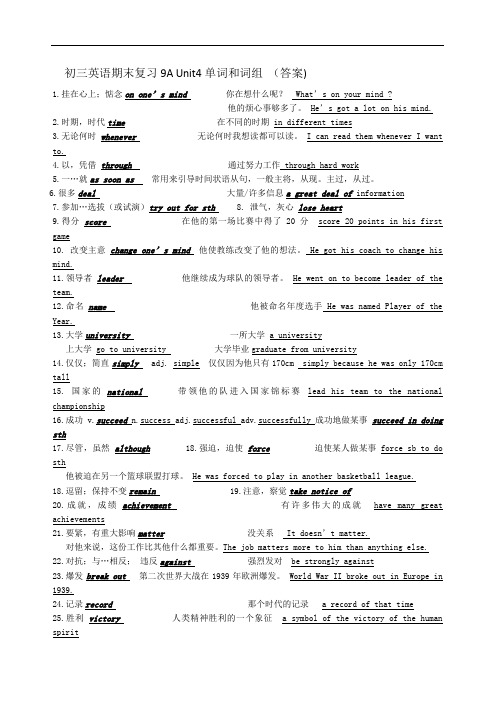
初三英语期末复习9A Unit4单词和词组(答案)1.挂在心上;惦念on one’s mind你在想什么呢? What’s on your mind ?他的烦心事够多了。
He’s got a lot on his mind.2.时期,时代time 在不同的时期 in different times3.无论何时whenever无论何时我想读都可以读。
I can read them whenever I want to.4.以,凭借through通过努力工作 through hard work5.一…就as soon as 常用来引导时间状语从句,一般主将,从现。
主过,从过。
6.很多deal大量/许多信息a great deal of information7.参加…选拔(或试演)try out for sth 8. 泄气,灰心lose heart9.得分score在他的第一场比赛中得了20分 score 20 points in his first game10. 改变主意change one’s mind他使教练改变了他的想法。
He got his coach to change his mind.11.领导者leader 他继续成为球队的领导者。
He went on to become leader of the team.12.命名name他被命名年度选手 He was named Player of the Year.13.大学university 一所大学 a university上大学 go to university 大学毕业graduate from university14.仅仅;简直simply adj. simple 仅仅因为他只有170cm simply because he was only 170cm tall15. 国家的national带领他的队进入国家锦标赛lead his team to the national championship16.成功v.succeed n.success adj.successful adv.successfully成功地做某事succeed in doing sth17.尽管,虽然although 18.强迫,迫使force迫使某人做某事 force sb to do sth他被迫在另一个篮球联盟打球。
初三英语重点单词短语

初三英语重点单词短语初三英语重点单词短语汇总导语:想要英语学得好,就要在平时积累写重点短语,在考试应用,下面是店铺总结的2017九年级人教版英语各单元重点短语、句型及作文,有需要的同学们可以看看。
Unit1 How can we become good learners?一.重点短语1. by doing sth 通过做某事2. ask sb. for help 请求某人的帮助3. be patient 耐心点儿4..improve one’ s speaking skills 提髙某人说的能力5. read aloud 大声朗读6. spoken English=oral English英语口语7. have conversations with sb. 与某人交谈 8. listen to tapes 听磁带9. make word cards 制作单词卡 10. make mistakes in grammar 犯语法错误11. make sentences with用.......造句 12. the secret to language learning语言学习的诀窍13. be afraid to do sth./ of sth,不敢'做某事14. fall in love with.. . 爱上(fell, fallen)15. body language 肢体语言16. take notes 记笔记(took, taken)17.learning habits 学习习惯 18. have sth. in common 有...共同点19. pay attention to (doing )sth注意(paid) 20. connect…with…把....与....联系起来21. write down key words 摘抄重点词22. in class 在课堂上after class 课后23. be interested in… 对.......感兴趣= take an interest in…24. do sth. on one’s own 独立做某事25. worry about=be worried about 为...而担忧26. depend on (doing) sth.依赖;取决于 27. look up a word ina dictionary查字典28. be born with 天生具有29 repeat: say or do… again30. how to pronounce 怎样发音 pronunciation 发音 look for 寻找31. practice doing sth.练习做某事 keep doing sth. 一直做某事32. each other = one another 彼此,相互 33. a part of... ... ...的一部分34. even if = even though 即使,虽然 35. instead of (doing) sth 代替35. bit by bit一点一点地,逐渐地 one by one 一个接着一个36. the way of doing sth. (to do sth) 做某事的方法37. at once=right now立刻,马上38. so that 以便,为了=in order that+从句 in order (not) to do sth为了(不)做某事39. hide behind躲在...的后面( hid, hidden) the+比较级,the+比较级越.. ....越40. wise / wisely active / activity/action memorize / memory discover / discoverycreate / creative patient / patience repeat it= say it again二.重点句型1. What about doing sth ?=How about doing sth.?例:What about listening to tapes?=Why not listen to tapes?2. by的用法a. 介词 prep. (指交通等)乘;例:The man came by bus. 那人是坐公共汽车来的。
人教新目标版英语九年级全册必背单词、短语、句型(期末复习提纲)
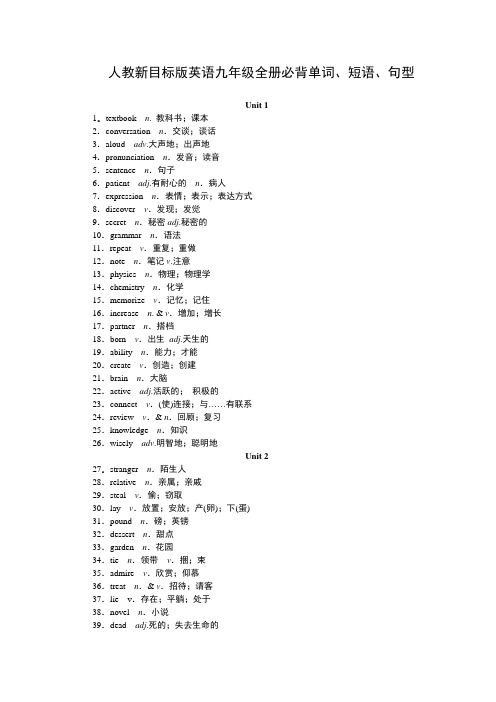
人教新目标版英语九年级全册必背单词、短语、句型Unit 11.textbook n. 教科书;课本2.conversation n.交谈;谈话3.aloud adv.大声地;出声地4.pronunciation n.发音;读音5.sentence n.句子6.patient adj.有耐心的n.病人7.expression n.表情;表示;表达方式8.discover v.发现;发觉9.secret n.秘密adj.秘密的10.grammar n.语法11.repeat v.重复;重做12.note n.笔记v.注意13.physics n.物理;物理学14.chemistry n.化学15.memorize v.记忆;记住16.increase n. & v.增加;增长17.partner n.搭档18.born v.出生adj.天生的19.ability n.能力;才能20.create v.创造;创建21.brain n.大脑22.active adj.活跃的;积极的23.connect v.(使)连接;与……有联系24.review v.& n.回顾;复习25.knowledge n.知识26.wisely adv.明智地;聪明地Unit 227.stranger n.陌生人28.relative n.亲属;亲戚29.steal v.偷;窃取30.lay v.放置;安放;产(卵);下(蛋)31.pound n.磅;英镑32.dessert n.甜点33.garden n.花园34.tie n.领带v.捆;束35.admire v.欣赏;仰慕36.treat n.& v.招待;请客37.lie v.存在;平躺;处于38.novel n.小说39.dead adj.死的;失去生命的40.business n.生意;商业41.punish v.处罚;惩罚42.warn v.警告;告诫43.present n.现在;礼物adj.现在的44.warmth n.温暖;暖和45.spread v.传播;展开n.蔓延;传播重点短语1.pay attention to注意;关注2.connect ... with把……和……联系起来3.take notes做笔记4.have a conversation谈话5.be born with天生具有6.put on (weight)增加(体重)7.lay out展开;布置8.be similar to与……相似9.end up最终成为;最后处于10.trick or treat不招待就使坏11.Christmas Eve圣诞节前夕12.dress up盛装打扮13.not only... but also...不仅……还……14.read aloud大声读必背句型1.What about listening to tapes?听磁带怎么样?2.It's too hard to understand spoken English.理解英语口语太难了。
上海中考英语重点单词词组词汇复习(有答案)

初三英语提高冲刺 (单词词组竞赛)1.能力,才能 ability__________________________ 2.实际上,现实地 actually__________________________ 3.负担得起 afford_________________________ 4.古代的,古老的 ancient__________________________ 5.安排,布置 arrange__________________________ 6.观众,听众 audience__________________________ 7.可用的,可得到的 available__________________________ 8.气球 balloon__________________________ 9.取消 cancel__________________________ 10. 世纪,百年 century__________________________ 11. 性格,特征 character__________________________ 12. 社区 community__________________________ 13. 接触,联系 contact__________________________ 14. 描写,叙述 describe__________________________ 15. 失望的,沮丧的 disappointed__________________________ 16. 灾难,灾祸 disaster__________________________ 17. 扰乱,打扰 disturb__________________________ 18. 效果 effect__________________________ 19. 精力,能量 energy__________________________ 20. 检查,考试 exam__________________________ 21. 实验 experiment__________________________ 22. 特别的,另外 especially__________________________ 23. 闪,闪光 flash __________________________ 24. 预告,预报 forecast_________________________ 25. 代,一代 generation __________________________ 26. 大方的,慷慨的 generous __________________________ 27. 政府 government__________________________ 28. 努力工作的 hardworking__________________________ 29. 犹豫,踌躇 hesitate__________________________ 30. 幽默的,风趣的 humorous__________________________ 31. 丈夫husband__________________________ 32. 立即,马上immediate__________________________ 33. 印象impression__________________________ 34. 调查investigate__________________________ 班级_____________姓名________________学号___________请不要在装订线内答题请不要在装订线内答题请不要在装订线内答题35.记者journalist__________________________ 36.旅行journey__________________________ 37.初级的,年少的junior__________________________ 38.灯笼lantern__________________________ 39.有限的,限制的limited_________________________ 40.位置,场所location__________________________ 41.机器machine__________________________ 42.材料,原料material__________________________ 43.方法,办法method__________________________ 44.班长,显示器monitor__________________________ 45.狭窄的narrow__________________________ 46.紧张的nervous__________________________ 47.通知,注意notice__________________________ 48.看法,观点opinion__________________________ 49.普通的,平常的ordinary__________________________ 50.应该,应当ought__________________________ 51.搭档,合作者partner__________________________ 52.乘客,旅客passenger__________________________ 53.表演,行动performance__________________________ 54.病人,耐心的patient__________________________ 55.物理physics__________________________ 56.先锋,开拓者pioneer__________________________ 57.塑料的plastic__________________________ 58.有礼貌的polite__________________________ 59.政治politics__________________________ 60.假装,装作pretend__________________________ 61.目的,用途purpose__________________________ 62.发音pronounce__________________________ 63.参考reference__________________________ 64.规则的,经常regular__________________________ 65.尊重,慎重对待respect___ 期望:expect_______ 66.粗糙的,风浪急的rough__________________________ 67.屏幕,荧光屏screen__________________________ 68.情况,场面situation__________________________ 69.社会society__________________________70.士兵,战士soldier_________________________71.支持,赞助support__________________________72.猜想,假定suppose__________________________73.技术technology__________________________74.温度temperature__________________________75.翻译translate__________________________76.无用的,废旧的useless__________________________77.胜利victory__________________________ 78.在。
精选初三英语单词复习
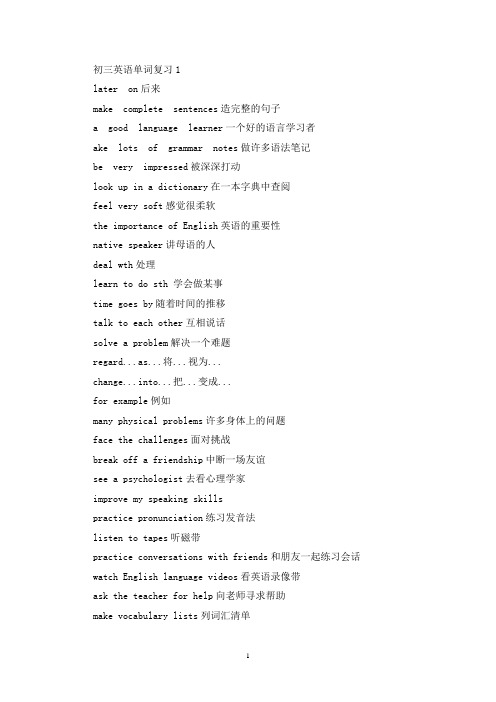
初三英语单词复习1later on后来make complete sentences造完整的句子a good language learner一个好的语言学习者ake lots of grammar notes做许多语法笔记be very impressed被深深打动look up in a dictionary在一本字典中查阅feel very soft感觉很柔软the importance of English英语的重要性native speaker讲母语的人deal wth处理learn to do sth 学会做某事time goes by随着时间的推移talk to each other互相说话solve a problem解决一个难题regard...as...将...视为...change...into...把...变成...for example例如many physical problems许多身体上的问题face the challenges面对挑战break off a friendship中断一场友谊see a psychologist去看心理学家improve my speaking skillspractice pronunciation练习发音法listen to tapes听磁带practice conversations with friends和朋友一起练习会话watch English language videos看英语录像带ask the teacher for help向老师寻求帮助make vocabulary lists列词汇清单make flashcards制作抽认初三英语单词复习2Ⅰauthorise(动词)授权、批准authorisation(名词)授权、委任authoritative(形容词)的、命令式的authority(名词)权力、职权、authorities(名词)-① Dr Li has authorised David to act for him in his absence.② The Ministry for Finance authorised the payment of annual increments.③ One needs special authorisation to enter such a building.④ This news came from an authoritative source, so it must be reliable.⑤ The Commander-in-chief spoke in an authoritative tone.⑥ As a senior officer, Jason is entitled to have authority over the clerical staff.⑦ Who gave you authority to implement the new salary scheme?⑧ Dr Wong is an authority on language teaching.⑨ The authorities concerned must see to it that the same thing will not recur.Ⅱclear(形容词)清楚的、明白的、无嫌疑的、债务已清的;(副词)远离的(动词)清除、解除。
上海中考英语考纲单词、词组默写

上海中考英语考纲单词、词组默写初三英语考纲词汇默写中文+词性能够;有能力的adj.能力;才能n.关于prep.大约;到处;四处adv.在……上面prep.在国外adv.接受;认可v.令人惊讶的adj.精确地adv.加;增加n.地址n.英文中文+词性得到;实现v.穿过;横过prep.扮演v.行动n.积极的;主动的adj.活动n.男演员n.女演员n.加上v.活着的adj.英文车祸,事故;意外的事n.adj.1、(修饰单数名词)全;总;整2、(修饰复数名词)全部;所有的全部adv.全部;全体人员pron.所有;全体职员n.允许,答应v.简直,差不多adv.单独地adv.沿着;顺着prep.采用,采纳;收养v. 广告n.劝说;警告n.担负得起……的费用;抽得出(工夫)prep.畏惧;忧郁adj.非洲n.有利条件;优势;优点n. 在……之后,在……后面prep.在后;厥后adv. 在……以后conj.下战书n.再一次;再;又adv.反对prep.时代;年龄n.有……之年岁的adj.代理人n.早年adv.同意;应允v.在前adv.目的n.瞄准v.氛围;大气n.空调n航线n.机场n.警报n.向前;和……一起;一同adv. 已经adv.也adv.虽然;尽管conj.总共;全部地adv.总是;永远adv.上午令人惊讶的adj.雄心;野心n.美国,美洲n.美国的;美洲的adj.美国人n.在(三者或三者以上)之间;系……中之一;与……在一同prep.数量;总数n.引起乐趣的,娱人的adj.1初三英语考纲词汇默写中文+词性现代的adj.和conj.生气地;愤怒的adv.生气的;愤怒的adj.动物n.再一;另外一;此外adj.另外一个pron.回答;答复;答案;回(信)n.回答;答复;回(信)v. (用于疑问句,否定句,条件句)一些;什么;任何的;任一的adj.(无论)哪一个;(无论)哪些pron.任何人pron.英文中文+词性到达;达到v.艺术n.文章n.艺术家;画家n.英文当……时;像……(一样);如同;因为;由于conj.一样地adv.当……时;作为;当作prep.亚洲n.问;请求;要求v.助手,助理n.在……(表示地点、时间、工具、偏向等)大西洋n.进攻;攻击v.出席,参加v.吸收v.有吸引力的adj.八月n.姑;姨;婶母;舅母n.澳大利亚n.澳大利亚的adj.澳大利亚人n.著者;作家n.自动的adj.秋天;秋季n.可用的;可得到的adj.平均;平均数n.甚么事(物);任何事(物)pron.任何中央adv.道歉v.出现v.苹果n.四月n.面积;地区n.争论;争吵v.手臂n.军队;陆军n.吸引;吸引力;吸引物n. 在……周围;环绕XXX.安排;布置v.2初三英语考纲辞汇默写中文+词性平均的adj.授予v.奖,奖品n.离开,远离adv.可怕的adj.婴儿n.向后;回原处adv.背;背后;后部n.糟糕;可惜;坏的;严重的adj.书包;提包;袋子n.均衡n.球n.气球n.香蕉n.银行n.酒吧n.基地;基础n.篮子n.篮球n.球拍n.洗澡n.战争;战役n.是;成为v.海滩n.英文熊n.美丽的adj.精美地adv.因为conj.变得;成为v.床n.卧室n.啤酒n.中文+词性英文在……前面;在……以前prep.早年adv.在……之前conj.请求v.入手下手;着手v.开始;开端n.在……后面prep.在后面;向后adv.人;生物n.相信;认为v.钟;铃n.属;隶属v.在……下面prep.带子n.在……旁;靠边prep.除了prep.(good和well的最高级形式)最好的adj.(well的最高级形式)最好地dv.敲打;打败;(心)跳动v. 3初三英语考纲词汇默写中文+词性最好的(人或物)n. (good和well的比较级方式)较好的adj.在(二者)之间prep.自行车n.大的adj.超片,纸币;账单n.书;本子n.预订(票,坐位)等v.令人厌烦的v.英文煮v.骨头n.中文+词性英文(动词bear的过去分词)出生箱子,垃圾箱n.鸟n.(向他人)借;借用v.两者(都);两人(都);双方pron.华诞n.两……(都);两个……(都)adj.饼干n.一点;一些n.咬v.黑色n.黑色的adj.黑板n.毯子n.瞎的adj.盲人n.一排房屋;街区(四条街道的区域);大块n. 吹;刮风;吹气v.蓝色n.蓝色的adj.板;木板n.两个都adv.瓶n.底部n.碗n.箱;盒n.男孩n.勇敢的adj.面包n.打破;打断v.休息n.早饭n.呼吸n.桥n.简短的,简洁adj.豁亮的;聪明的adj.豁亮地adv.带来,拿来v.登,上(飞机,船等)v.划船(游玩)v.身体;躯体n.4初三英语考纲辞汇默写中文+词性不列颠(即英国)n.英国人n.英国的adj.广播;节目n.兄弟n.英文中文+词性再见int.卷心菜n.蛋糕;饼;糕n.计算器n.英文称呼;取名;呼唤;打电话给…v.棕色;褐色n.棕色的;褐色的adj.刷子n.刷;擦v.建造;建筑v.建筑物;大楼n.外滩n.燃烧v.公共汽车n.商业;生意n.商人n.女商人n.忙adj.但是conj.黄油n.蝴蝶n.按钮;纽扣n.采办v.靠近;在……旁边;(指时间)不迟于;(用于被动语态)被prep.叫;喊;(一次)电话,通话n. 照相机n.野营n.能,会;可能v. aux.加拿大n.加拿大的adj.加拿大人n.取消v.烛炬n.帽子n.首都n.船长n.小汽车n.卡片n.小心;关心;照管XXX. 小心的;仔细的adj.小心地;仔细地adv.胡萝卜n.运送;搬运;照顾v.5初三英语考纲辞汇默写中文+词性动画片;漫画n.箱,盒;案件n.猫n.患(病);弄清楚;体会;理解v.原因n.使产生,引起v.庆祝v.分(美国泉币单位)n. 中心;中央n.世纪,百年n.一定的,有掌控的adj. 好adv.椅子n.机遇n.改动;变动;兑零钱v. 易变的,可变的adj. (电视)频道n.角色n.主管,掌管n.慈悲n.廉价的,廉价的adj.检查XXX.欢呼;喝彩XXX.奶酪n.化学的adj.英文中文+词性化学物资n.化学n.国际象棋n.胸n.小鸡;鸡肉n. 首领,头目n. adj.孩子;儿童n. 中国n.中国人;汉语n. 中国的adj.巧克力n.挑选n.挑选v.圣诞节n.教堂n.香烟n.电影院;电影n. 圆,圈n.市民n.城市n.拍手v.& n.英文接住;捉住;赶上(车辆);首要的,首要的;首席的一定;无疑;是的,固然;特征,特性;性格;人物,班级;(一节)课;等级n.同砚n.教室n.干净的;清洁的adj.打扫;弄洁净;擦洁净v.模糊的;豁亮的;清楚的adj.清楚;打扫(天气)转晴v.模糊地;豁亮地;清楚地adv.6初三英语考纲词汇默写中文+词性职员;办事员n.聪明的adj.气候n.爬v.医务室n.时钟n.关;闭v.近的adj.近;靠近adv.衣服n.云n.多云的;阴天的adj. 海岸n.外衣;上衣n.咖啡n.硬币n.冷的;寒冷的n.寒冷;着凉;感冒n. 收集;采集v.收集n.学院n.颜色n.涂色v.来;来到v.惬意的adj.普通的adj.交流,交际v.公司n.比力v.比赛n.7英文中文+词性抱怨;投诉v.完全的,完全的adj.完成,结束v.计算机n.音乐会n.结论;竣事,结局n.英文(汽车、电车上的)售票员;(火车上的)列车员n. 集会;讨论会n.确信的;有信心的,自信的adj.使混淆v.祝贺n.连接;把……连接起来构成;构成v.竞赛n.洲;大陆n.连续v.控制v.& n.便利的;方便的adj.会话;说话n.厨师;炊事员n.烹调;煮;烧v.凉的;风凉的;酷adj.冷却v.抄本;副本;一本(份,册)n.抄写;复制;模仿v. 角;拐角n.正确的adj.初三英语考纲辞汇默写中文+词性矫正;纠正v.值(几何钱);破费v. 棉花n.咳嗽v.& n.数v.国家;农村;乡下n.英文中文+词性破损v.舞蹈v.& n.危险n.危险的adj.黑暗;黑色;深色n.英文黑暗的;黑色的;深色的adj.(一)对,(一)双,(一)副n.过程;课程n.日期n.女儿n.(一)天;(一)日;白天n.死的;无生命的adj.堂(表)兄,弟;堂(表)姐,妹n.掩盖;隐瞒;袒护v.分派,分给;赐与;经营;对付v.掩盖物;封面n.母牛n.亲爱的adj.呵,哎呀(表示伤心,交际,惊奇等)int.发狂的,疯狂的adj.创造;创作v.十字,叉n.穿越v.拥挤的;满座的adj. 喊叫;哭v.& n.文明n.杯子;杯n.气;风俗n.顾客n.死亡n.争论,辩论,讨论n. 十二月n.决定;下决计v.决定n.装饰v.深adj.学位,度n.耽搁,延误XXX.美味的,适口的adj. 送达,传送v.牙科医生n.百货商店n.启程;离开;出发n. 依靠,依赖v.切;割;剪;砍;削v. 骑车v.日报n.8初三英语考纲辞汇默写中文+词性描述v.沙漠n.值得v.设计v.书桌;写字台n.破坏n.侦探的adj.侦探n.英文中文+词性不喜欢v.英文陈列,展览;显示XXX. 间隔n.分,划分;除v.干;做(事)v.放在主语前构成疑问;与not连用构成否定句v. aux.医生n.狗n.(美国、加拿大等国的货币单位)元n.门;通道n.向下adv.prep.往楼下;在楼下adv. 画,绘制;拉,拖v.梦想;梦n.服装,女装,童装n.穿衣v.喝;饮v.饮料;喝酒n.驾驶;驱赶v.驾驶员,司机n.滴n.扔;掉v.干的;干燥的adj.鸭n.乏味的adj.发展;开发,培养v. 发展n.对话n.日志n.辞典;辞书n.死v.食品;食谱n.区别n.adj.困难的;困难的adj.困难n.v.餐厅n.正餐n.脏的adj.消逝v.发现,看出v.讨论v.讨论n.盘;碟;(盘装)菜肴不诚实adj.沿着(街道、河流)而下不同的;差异的挖(洞,沟等);掘9初三英语考纲词汇默写中文+词性馄饨;汤团n.在……的时代prep.责任n.英文电n.电子的adj.低级的;根本的adj.大象n.其他的;此外adj.空的adj.勉励;怂恿v.初步;起点;末了n. 结束v.仇敌n.活力;能量n.引擎,发起机n.工程师n.英格兰n.英国;英国人;英语n. 英国的;英语的adj.观赏;享有;喜欢v.中文+词性英文每人;每个;每件adj. 每人;每个;每件pron. 渴望的adj.耳朵n.早的adj.地球n.容易地adv.东,XXX.东方的adj.吃v.经济;节约n.教育n.教育的adj.效果n.效率高的;有能力的adj.蛋;卵n.容易的;不费力的adj. 令人舒畅的,令人欢喜的adj.足够的充分的adj.足够地;充分地adv. 充足;充分n.进入;参加v.入口n.信封n.环境n.(两者中)任何一方(的);两者之一的adj. (两者中)任何一方(的);两者之一的adj. (两者中的)任何一方;两者之一pron. (用于否定句或否定短语)也(不)adv.等于v.逃跑;逃亡v.特别地adv.住宅区n.年龄较大的;年长的adj.电的adj.10初三英语考纲词汇默写中文+词性欧洲n.(节日的)前夜,前夕n.甚至;连(……都);更adv.薄暮;早晨n.比赛项目;变乱n.每一;每个的adj.每人;人人pron.每日的;一样平常的adj. 每件事;事事pron.到处adv.确切地,精确地;(表示赞同的回答)确实如此adv.测验;测试;检查n. 检查;细查;对……进行考试v.例子;榜样n.极好的adj.除……之外prep.交换;交流v.镇静的adj.使人兴奋的adj.原谅;宽恕v.接口;辩解n.锻炼;做操;练,题n.展览;博览会n.期待v.破费;费用n.11英文中文+词性昂贵的adj.经验;经历n.实验n.解释;说明v.探究,探索;勘察v. 伸,伸出v.眼睛n.寓言n.脸,面孔n.事实;实际n.工厂n.失利;不及格v.英文曾经;在任何时候adv. 公平的;合理的adj.落下;下降;倒下;跌倒v.熟悉的adj.家庭n.有名的adj.扇子n.远的adj.远地adv.农场;农庄n.农民,农民n.快的,迅速的adj.快地;迅速地adv.肥胖的adj.脂肪n.初三英语考纲词汇默写中文+词性父亲n.恩惠n.最喜爱的adj.传真n.恐惧n.二月n.豢养;豢养v.感觉;摸;触v.女性;雌性n.围墙;栅栏n.渡船n.节日n.取v.发烧n.不多;少数pron.不多的;少数的adj.英文中文+词性火;火炉;火灾n.消防队员n.炊火n.第一的;最初的adj.第一;首先;最初adv. 入手下手;初步n. 鱼;鱼肉n.捕鱼;钓鱼v.渔夫,捕鱼人n.适合;与……相配v. 健康的adj.安装;修理v.旗n.闪光;闪现;手电筒n.一套房间;公寓n.飞翔n.洪水;水灾n.花n.飞;飞翔;乘飞机游览v. 雾n.听从v.下列的adj.喜爱的adj.食品;食品n.傻子n.愚弄;欺骗v.愚蠢的;傻的adj.英文田地;牧场;场地;原野;战地n.打仗v.外形;数字n.装满;注满;充溢v.电影;影片;胶卷n.末了的;终究的adj.最终;最后adv.找到;发现;发觉v.(身体)好;美好的;晴朗的adj.手指n.竣事;做完v.地面;地板;(楼房的)层n.12初三英语考纲词汇默写中文+词性轻柔地adv.地理n.德国人;德语n.德国的adj.德国n.成为;变得;得到;到(用于have got短语中)有v. 女孩n.给;递给;支付v.镇静的;甘愿应允的adj. 玻璃;玻璃杯;(pl.)眼镜n.全球的;球形的adj.手套n.v.目标n.n.金;黄金n.金色的adj.好,良好adj.再见;再会int.政府n.半;一半adj.大厅;礼堂n.手n.递;给;交付v.悬挂v.发生;碰巧v.幸福地;快乐地adv.幸福的;XXX的adj.口岸;港湾n.adj.努力地;(雨、雪等)猛烈地adv.气n.头发n.一半n.猜测;推测v.客人;宾客n.指点;导游;指南n. 炮;枪n.英文中文+词性巨大的;重要的(白话)美妙的;好极的adj.绿色;青色n.绿色的;青色的adj.空中;土地;举动n.群;小组n.生长;发育;种植v.英文去;走;驶;通道;达到等级:(黉舍的)年级n. 大学毕业生n.大学卒业;卒业v. (外)祖父n.(外)祖母n.草;草场;牧草n.硬的;困难的;艰难的13初三英语考纲词汇默写中文+词性巨大的;庞大的adj.人们的;人类的adj.人n.诙谐;诙谐感n.饥饿地adv.饥饿的adj.打猎v.赶紧;急忙v.& n.痛;使受伤痛v.丈夫n.小屋;棚屋n.冰n.冰淇淋n.n.1.(毗连状语从句)假如;假使2.(毗连宾语从句)是不是;是不是conj.有病的;不健康的adj.病;疾病n.立即adv.重要性n.重要的adj.不可能的adj.改善;改进v.在……中2.在……(工夫)、3.……(情况、状态)中4.以……(方法);使用……(言语)5.穿;戴prep.14英文中文+词性在家;在内;向内adv. 英寸n.包括;包含v.增加;增加;促进v.的确;真正的adv.独立的;有主见的adj. 印度人;印第安人;印第XXX.印度的;印第安人的adj. 个人的,个体的adj.室内的adj.信息;情报;资料n.墨水n.prep.……之内;在里面;在内部adv.英文主意;意见;打算;想法在……里面;在……之内代替;顶替adv.兴趣;趣味n.感乐趣的adj.有趣的;有意思的adj.国际的adj.英特网(国际互联网)n.面谈,访谈,采访v.& n.1.(动作方向)到……内;向内2.(表示情况和结果的变化)酿成prep.1.(位置)在内;在里面;初三英语考纲词汇默写中文+词性介绍v.创造,创造v.英文中文+词性法官,评判员n.审判,评定v.果汁n.七月n.跳;跳跃v.跳;跳跃n.六月n.低级的adj.英文发明,创造;发明物n. 发明者,发明家n.邀请n.邀请v.铁n.岛屿n.意大利人;意大利语n. 意大利的;意大利语的adj.意大利n.节目;项目n.短上衣,夹克衫n.果酱;拥堵n.一月n.日本n.日本人;日语n.日本的adj.牛仔裤n.工作;零活n.参加;加入v.玩笑n.开玩笑v.旅行n.欢乐;高兴n.恰好;恰好;刚才;仅;不外adv.热心的adj.保持;保存;保持(某种状态)连续不竭v.钥匙;答案n.键盘n.踢v.开玩笑v.小孩n.杀死,弄死v.公斤,千克n.公里,千米n.友好的;和蔼的adj. 种;类n.幼儿园n.仁慈;好意n.XXX;国王n.厨房n.风筝n.15初三英语考纲词汇默写中文+词性小刀n.敲;击;敲门v.敲门(声)n.了解;知道;认识v. 知识n.实验室n.女士n.湖n.灯n.陆地;土地n.降落;登陆v.语言n.灯n.大的;巨大的adj.英文中文+词性离开;把……留下;剩下v.。
[初三英语]九年Unit2单词、词组、句子总汇测试
![[初三英语]九年Unit2单词、词组、句子总汇测试](https://img.taocdn.com/s3/m/fe545cd33169a4517623a301.png)
Unit2 I used to be afraid of dark .一、单词默写:过去经常;以前常常_______对……感兴趣_________飞机_____________使害怕,使恐惧____________害怕……;恐惧……_________入睡_______________开着的,接通的,工作着的______昆虫__________糖果___________嚼;咀嚼________口香糖____________聊天;闲谈_________每日的__________(报纸上所刊载的)连环漫画_____死:死亡_______得起;担负得起_______造成,使发生_______(反身代词)他自己,他本身_____有耐性的;忍耐的_________最后;终于___________决定;决心___________下决定:下决心____________班主任______________必须的,必需的___________令某人惊奇的(是)……_________正;恰恰____________即使:纵然;尽管__________不再:已不___________对……感到自豪______注意,专心;留心_________对……注意;留心_____________放弃________ 浪费;滥用________不再:已不________二、词组:1.对…更感兴趣.2.游泳队的队员.3.害怕.4.体操课.5.担心.6.一直, 总是7.与…闲聊8.几乎从不9.步行去学校10.不仅…而且11.遇到麻烦12.做出决定13.使某人吃惊的是14.为…感到骄傲15.留心, 注意16.由…组成/构成.由…组成/构成.17. 代替, 而不是18.最后, 终于19.弹钢琴三、句子:1.我过去害怕黑暗2.你过去个子矮,不是吗?是的3.你过去弹钢琴吗?4.我过去不喜欢考试5.她过去留着卷发6.难道你不记得我了吗?7.现在我对踢足球更感兴趣8.我过去是足球队队员9.人们的确在变化10.我过去害怕独处,我现在依然害怕独处11.乘飞机12.我开着卧室的灯入睡13.在众人面前发言Section B1.经常咀嚼口香糖2.我的最大问题是我太忙了3.如今4.整天呆在学校5.直接回家6.花许多时间和朋友一起玩游戏7.与某人聊天8.我不再有那时间了9.带我去参观音乐会10.我几乎没有时间去参加音乐会11.我真的怀恋我过去的日子12.在过去13.我的变化真大啊14.在过去几年里我的生活变化大15.我的日常生活Reading1.不要过多地担心事情,它会让你紧张2.移居到3.留长发4.他似乎变化很大5.得低分6.制造许多麻烦7.一个15岁的男孩8.他过去是一个有问题的男孩9.和他妈妈的最近一次谈话改变了他的生活10.几年前在他父亲去世之后11.他的妈妈负担不起她孩子的受教育的费用12.为了这样做,她不得不工作13.他妈妈尽可能把他照看好14.他经常和警察发生冲突15.放弃做某事16.最后17.做出一个困难的决定18.决定去做某事19.送他去男孩寄宿学校20.我们每天锻炼是必要的21.使某人惊奇的是22.我的妈妈帮我明白了她曾经为我付出了多少23.不再24.以我所做的每一件好事而自豪25.自从我父亲死后,我害怕独处,并且设法让我的妈妈更多地注意我26.他妈妈的爱帮他感到自信27.正如某人所说的28.父母的存在对孩子来说非常重要29.浪费时间30.他妈妈说的话没有改变他的主意31.他不再打网球了32.对…….耐心33.即使。
人教版九年级英语全一册 Unit14 总复习 练习题教学课件PPT初三公开课
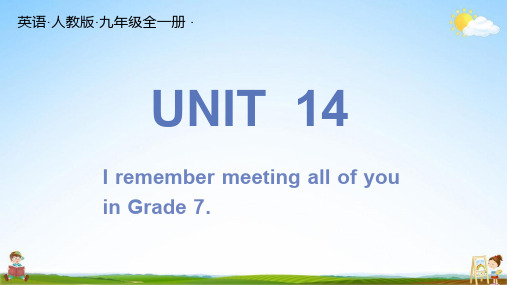
英语·人教版·九年级全一册 ·UNIT14I remember meeting all of youin Grade7.一、根据汉语或首字母提示写出单词1.[2020浙江宁波中考] "If you work hard, your exam score will (加倍)," the teacher said to Jim.2.[2020黑龙江牡丹江中考] American eating habits are quite different from (我们的).3.I am glad your English (水平) has improved a lot.1.double 老师对吉姆说:"如果你努力学习,你的考试成绩会加倍。
"2.ours 句意:美国的饮食习惯与我们的有很大的不同。
空后没有名词,空处应用名词性物主代词ours代替"our eating habits"。
3.level 句意:我很高兴你的英语水平已经有了很大的提高。
4.Mrs. White said that Mr. White is a (体贴人的) husband.5.[2020成都中考]Ms. Wang is very strict with us. She always asks us to do everything according to heri .6.If you want to reach a high s in spoken English, you will have to work hard.4.caring 句意:怀特太太说怀特先生是一位体贴的丈夫。
5. instruction(s) 由上句"王老师对我们很严格"可推知,她总是让我们根据她的指示做一切事情。
instruction 意为"指示,命令"。
初中中考英语短语专题训练

初中中考英语短语专题训练
以下是一些初中中考英语短语,供您进行专题训练:
1. 花费时间/金钱做某事:It takes sb. some time to do sth.
2. 参加:join
3. 骑自行车:ride a bike
4. 打篮球:play basketball
5. 打扫房间:clean the room
6. 看电视:watch TV
7. 去度假:go on vacation
8. 玩游戏:play games
9. 做家庭作业:do homework
10. 去游泳:go swimming
11. 去滑冰:go skating
12. 去钓鱼:go fishing
13. 去野餐:go on a picnic
14. 去爬山:go hiking
15. 去旅行:go on a trip
16. 去购物:go shopping
17. 去电影院看电影:go to the movies
18. 去图书馆看书:go to the library
19. 去公园散步:go for a walk in the park
20. 去音乐会听音乐:go to a concert
21. 去博物馆看展览:go to the museum
22. 去游乐园玩:go to the amusement park
23. 去艺术馆欣赏艺术品:go to the art gallery
24. 去图书馆借书:borrow books from the library
25. 去书店买书:buy books from the bookstore。
外研版初三英语上册M1——M3知识点练习
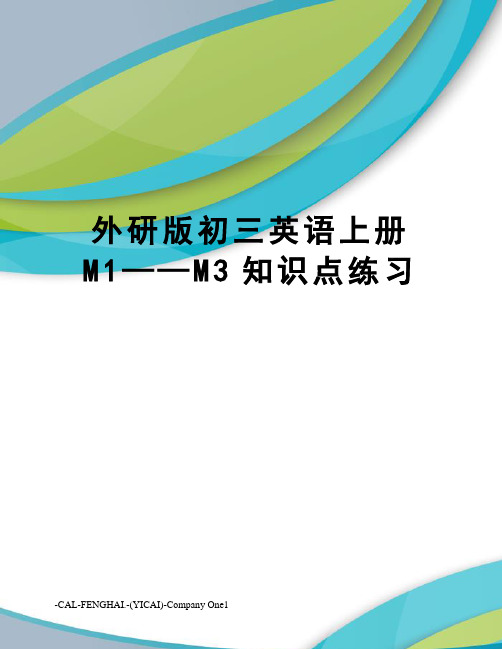
外研版初三英语上册M1——M3知识点练习-CAL-FENGHAI.-(YICAI)-Company One1外研版九年级上1----3模块综合复习资料一 1---3模块单词复习训练1. His uncle got a _________(机会) to study in the United States.2. His _________(技能) in speaking makes him popular with his friends.3. Li Ming is often ___________(鼓励) by his parents to learn English.4. Five school __________(最高记录) were broken at the school sports meeting.5. We were ___________ (打败)last time..6. Yao Ming is not an ____________ (一夜的)success .7. They will be ______________ (允许) to watch the football match tonight .8. I think it will be a ______________ (艰苦的) match . 9. We all know that the sun __________ (升起) in the east.10. We hope Liu Xiang will go for more ___________ (奖牌)for China in the future .11. There were many important inventions in ______________(古代的) China.12. I read several ____________(广告) in the newspaper just now.13. He was _____________ (惩罚) for what he had done. 14. Parents and teachers should be______________ (尊重)15. I don’t think your brother’s ___________(行为) is right. 16. I have written two English_________(作文) this term.17 My teacher asks me to exercise ______________(有规律的) to keep healthy.18. I wrote to her last month, but she hasn’t __________(回答) to my letter yet.19. There were many important inventions in __________(古代的) China.二1---3模块短语总结复习1 注意听2 我一点都不知道3 对某人进行一次采访4 取得好成绩5 对…作评论6 答复某人7 在…的边缘8 在…的底部 9 向对面看 10 看某人的左边 11 代表12 被击败 13 让某人烦恼 14 生某人的气 15 为了16 允许某人做某事 17 鼓励某人做某事 18 给某人一个机会19 打破一个记录 20 首先 21一夜成名 22 跳高23 建立 24把…比作… 25把…制作成…26宁愿做某事而不做某事 27与。
九年级英语各单元重点单词+词组+语法知识点总结

九年级英语全册各单元知识点总结Unit1How can we become good learners?一、短语:1.have conversation with sb.同某人谈话2.connect…with…把…和…连接/联系起来3.the secret to………的秘诀4.be afraid of doing sth./to do sth.害怕做某事5.look up查阅6.repeat out loud大声跟读7.make mistakes in在……方面犯错误8.get bored感到厌烦9.be stressed out焦虑不安的10.pay attention to注意;关注11.depend on取决于;依靠12.the ability to do sth.做某事的能力二、知识点:1.by+doing:通过……方式(by是介词,后面要跟动名词,也就是动词的ing形式);2.a lot:许多,常用于句末;3.aloud,loud与loudly的用法,三个词都与“大声”或“响亮”有关。
(1)aloud是副词,通常放在动词之后。
(2)loud可作形容词或副词。
用作副词时,常与speak,talk,laugh等动词连用,多用于比较级,须放在动词之后。
(3)loudly是副词,与loud同义,有时两者可替换使用,可位于动词之前或之后。
4.not…at all:一点也不,根本不,not经常可以和助动词结合在一起,at all则放在句尾;5.be/get excited about sth.:对…感到兴奋;6.end up doing sth:终止/结束做某事;end up with sth.:以…结束;7.first of all:首先(这个短语可用在作文中,使得文章有层次);8.make mistakes:犯错make a mistake犯一个错误;ugh at sb.:笑话;取笑(某人)(常见短语)10.take notes:做笔记/记录;11.native speaker说本国语的人;12.make up:组成、构成;13.deal with:处理、应付;14.perhaps=maybe:也许;15.go by:(时间)过去;16.each other:彼此;17.regard…as…:把…看作为…;18.change…into…:将…变为…;19.with the help of sb.=with one's help在某人的帮助下(注意介词of和with,容易出题)pare…to…:把…比作…compare with拿…和…作比较;21.instead:代替,用在句末,副词;instead of sth/doing sth:代替,而不是(这个地方考的较多的就是instead of doing sth,也就是说如果of后面跟动词时,要用动名词形式,也就是动词的ing形式)22.Shall we/I+do sth.?我们/我…好吗?23.too…to:太…而不能,常用的句型是too+形容词/副词+to do sth.Unit2I think that moon cakes are delicious!一、短语:1.the Lantern Festival元宵节2.the Dragon Boat Festival端午节3.the Water Festival泼水节4.remind sb.of使某人想起5.eat five meals a day一天吃五餐6.put on five pounds体重增加了五磅7.treat sb.with.用/以……对待某人8.be similar to...与.......相似9.end up最终成为/处于10.share sth.with sb.与……分享……11.as a result结果12.one...the other...(两者中的)一个…另一个…13.take sb.out for dinner带某人出去吃饭14.dress up乔装打扮15.haunted house鬼屋16.the beginning of new life新生命的开始二、知识点:1.宾语从句:(三大考点:引导词、时态和语序。
初中英语中考复习初三上单词过关

初三上单词过关(381个)n. 机器人adj.(little 的比较级)较少的adj.(few 的比较级)n. 污染n. 建筑物; 房屋n.宇航员n.火箭n. 太空; 空间太空站v. 落下; 跌落; 变为;秋季爱上a.单独的ad.单独地n. 宠物n.鹦鹉ad.或许,大概,很可能去滑冰n.一套衣服vt.适合能够v. 穿衣ad.偶然地,临时地,随意地adv. 甚至n.面试,面谈vt.预言,预测n.预言; 预报n. 将来, 未来未来实现n.&v. 声音;听起来n. 公司n.小说,虚构a.不愉快的n. 科学家adv.&conj. 可是, 然而n. 百好几百, 许许多多adv. 早已, 先前;已经n. 工厂a.这样的,如此的a. 厌烦的,无聊的n.人,人类n.形状,外形a.巨大的n.地震n. 蛇寻找adj. 可能的adj. 不可能的a.电的,电动的n. 牙齿(pl. teeth)n. 牙刷v. 似乎,好像n. 家务, 家务事n.等级,品位;收视率不让…进入adj. 高声的; 大声的v. 争论, 争吵n.争论,辩论,理由adj. 错误的; 有毛病的怎么了?你怎么了?怎么了?n.风格,式样不时髦的, 过时的时髦的, 流行的打电话给n. 票, 入场券v. 使惊奇; 使意外用电话交谈; 在通话付款兼职工作pron.(两者)任何一个;也vt.烤,烘n.家庭教师vt.教a.原始的,创新的,新颖的n.理发; 发型, 发式prep. 除; 把……除外adj.心烦的,不安定v. 失败,不及格相处, 进展prep. 到……为止v. 适合, 适应尽可能n.压力vi.抱怨, 控拆v. 包括; 包含a. 固执己见的,一意孤行的v. 发送, 寄各种vt.比较a.疯狂的pron. 他们自己(反身代词)n.成年人adv. 一方面adv. 另一方面n. 自由不明飞行物n.理发师理发店n. 浴室; 洗澡间n.卧室;寝室n. 厨房,出去, 离开n.外星人; 外国的v. 着陆n.. 衬衫起飞n.经验,感受,经历adv. 大约adj. 奇怪的;陌生的v. 跟随; 追随a.令人惊异的adj. 恐惧的v. 攀爬; 爬v. 跳; 跃v.呼喊, 呼叫火车站跑掉ad.任何地方v. 发生n. 事故, 意外的事北京国际机场adj. 现代的,现代化的n. 孟斐斯n.谋杀vt.谋杀听说adj. 明亮的; 聪明的n.操场,运动场n. 钟; 铃n. 鸣; 响; 戒指v. 告诉,讲述n.寂静,沉默发生a.最近的世界贸易中心vt.破坏,毁坏n.恐怖分子n. 意思; 含义像…一样v. 成为; 变成n.航班,飞行n. 地球; 陆地n.英雄,男主角n.悲剧,惨案adv. 曾经; 永远adj. 疯狂的; 狂热的adv. (不)再; 再也(不)n. 小吃直接引语间接引语首先n. 消息; 信息传递v. 假定; 认为; 期望假定, 被期望或被要求adj. 勤劳的,努力工作的在…做得好身体健康成绩单adj. 神经紧张的; 不安的n.信封a.幸运的adv. 幸运地n.学期adj. bad的最高级adj. 真实的a. 使人失望的v. 复制; 抄袭adj. 自己的克服; 恢复; 原谅n. 乡村北京大学n.大学毕业生vi.毕业n.志愿者教育部中国少年先锋队a.乡下的,乡村的n. 地区; 区域n. 米; 公尺海平面adj. 稀薄的ad.幸运地,幸亏n. 决定; 决心n. 丈夫n.宿舍高中v.打开n. 开始; 开端n. 影响n. 家乡; 故乡“绿色和平”组织照料, 照顾n. 边界; 边境联合国儿童基金会n. 危险n. 牛仔裤v. 组织adj. 有组织的n. 组织拿走清除; 打扫n. 花n. 代理人; 代理商在世界各地谋生prep.反对, 靠在,对着n. 慈善团体; 慈善事业n. 机会; 机遇一直adj. 受伤的; 受损害的adv. 真诚地n. 专业,职业adj. 专业的,职业的n. 律师n. 今晚移动电话v. 收集; 搜集n. 收集家,收税员n.贝壳; 壳n.马拉松n. 一对; 一双v. 溜冰n.溜冰鞋n. 滑雪prep.自从, 因为山顶学校(一校名)v. 筹集; 抬起,抚养adj. 几个的; 数个的n. 邮票n. 风筝n. 怪物n. 球,球状物,地球仪v. 储存pron. 任何人用完, 用尽n. 蛋糕; 糕、饼类食品ad.特别,尤其顺便; 附带说说a.普通的,共同的a.额外的ad.特别地n. 钱币; 硬币n.话题, 主题对…感兴趣n.作者, 作家n. 省会; 首都n.欧洲adj. 欧洲的; 欧洲人的a.俄罗斯的n.俄罗斯人的a.澳大利亚的n.犹太人a.犹太人的比…多n. 一千n.皇帝n. 外国人adv. 相当; 十分adj. 确实的; 无疑的; 某一个奥林匹克运动会在远处v. 思念; 想念n. 介意一点也不调节(收音机等)使音量变小n. 院子立刻, 马上n.碟,盘子n.任务,工作;作业n. 海报n. 女服务生v. bring的过去式n.衣服(总称)n.布料n.服装,被褥n. 解答n. 线,排; 队; 列排队等候插队v. 使恼怒, 使生气adj. 恼怒的, 生气的adj. 有礼貌的; 客气的ad. 客气地, 斯文地adj. 无理的; 粗鲁的adv. 或许; 大概v. 归还; 返回压低声音; 使缓和n. 声音n.学期;条件;术语n.礼仪, 礼节a.正常的,普通的v. 举止; 表现n.行为,举止,表现首先adj. 亚洲的; 亚洲人的adj. 不舒服的v. 允许; 承认n. 公众当心, 小心v. 咳嗽v. 打喷嚏v. 打破, 违背违反规则v. 抽烟; 吸烟熄灭; 关(灯)n.香烟vt.批评adj. 当心; 小心v. 落下; 掉下;丢, 扔n. 垃圾, v. 乱丢垃圾v. 采; 摘; 挑选捡起n.建议; 提议vt.建议;提议n.评论,意见,注释n.集子; 相片簿; 唱片集私人的; 个人的特别的; 特殊的; 专门的收到; 接受n. 家伙,人n.蜘蛛老鼠n. 仓鼠n.海龟n.小孩adj. 大腹便便的, 大肚子的n.猪有利条件; 优点n.缺点, 弱点流行的完美的; 理想的n. 兔子, 野兔a.清洁的,纯洁的n.价值(若干); 花(多少钱)睡着的入睡v. 选择v. 进入n. 礼物n. 礼物vt.打开ad.后来赠送, 分发n.长凳,条凳,工作台胜于瑞典代替; 而不是等于the Olympic Gamesad.几乎, 差不多ad.清楚地n.舞台a.本土的, 本国的n.获胜者a.谦虚的a.有兴趣的; 感兴趣的v.鼓励n. (不指明性别的) 发言人n.进步; 前进奥委会听到, 听说v. 对...感兴趣而且; 除……之外与…交朋友n. 声明; 陈述vt.提及, 说起vt.驾驶,驱使n.复习; 回顾n.事件,(尤指)重要事情n.结果n.vt.(正式或礼貌地)要求, 请求n.道歉,致歉vt.解释,说明n.战略,策略a.下列的, 下述的为了vi. 提高,改进。
- 1、下载文档前请自行甄别文档内容的完整性,平台不提供额外的编辑、内容补充、找答案等附加服务。
- 2、"仅部分预览"的文档,不可在线预览部分如存在完整性等问题,可反馈申请退款(可完整预览的文档不适用该条件!)。
- 3、如文档侵犯您的权益,请联系客服反馈,我们会尽快为您处理(人工客服工作时间:9:00-18:30)。
初三总复习1(初一单词、词组训练教师版)【复习目标】1、熟记已学过的一整册的单词。
2、掌握初一整册的重要词组。
3、掌握不同词性的单词在句子运用中的变化。
【课前准备】1、要求学生复习每册书最后的单词按词性分类表。
2、要求学生对学过的单词,词组进行复习归来,了解词的变化并记忆。
【知识要点】1、根据中文意思或音标写单词,准确地拼读音标,确切地记住每一个单词的读音、意义、词性,分析句中成分。
注意一些专用名词的书写,首字母大写。
(上课时,按照词性进行归类,让学生说出尽可能多的单词)2、词形式的变化1)名词单数变复数(1)名词后直接加s,例如cake—cakes(2)以ch, sh, x, s结尾的词加es,例如:watch—watches, bus—buses, dish—dishes(3)以元音字母加y结尾的词直接加s,如:boy—boys, toy—toys,以辅音字母加y结尾的词去y变i,加es,如:factory—factories(4)以fe或f结尾的词变fe/f为v再加es,如:wife—wives(5)以o结尾的词可分+es, potatoes, tomatoes +s, photos, radios(6)不规则变化:man—men, woman-women, mouse—mice, child—children, sheep—sheep, deer-deer,Japanese—Japanese, tooth-teeth(7)people(人们),clothes…为集体名词,表复数,不可作单数使用。
(或参见第31讲名词)2)动词的第三人称单数形式一般现在时主语是第三人称单数时,动词第三人称单数形式的构成方法与名词的复数构成方法基本相同。
(除go 等以o结尾的动词要加es)3)动词的现在分词形式现在进行时中,动词要用现在分词形式,其构成方法:(1)一般动词直接加-ing,例如:go-going, ask-asking(2)以不发音字母e结尾的动词,先去“e”,再加-ing,例如:take-taking(3)以重读闭音节结尾的词,如果末尾只有一个辅音字母,应先双写这一字母,再加-ing,如:sit-sitting,begin-beginning4)名词的所有格名词的所有格构成:(1)单数名词直接加's,例如:Kate's brother(2)以s结尾的复数名词,则加’,例如:the twins' brother(3)不以s结尾的复数名词则加's,例如:men's room5)代词的人称、数、格(详见第32讲)3、词性的变化1)名词形容词(1)加-ese,例如:China Chinese, Japan Japanese(2)加-ly,例如:friend friendly, love lovely(3)加-ful,例如:care careful, help helpful2)形容词名词different-difference,important-importance,good-goodness,ill-illness3)形容词副词加ly,例:usual-usually, creful-carefully, happy-happily, easy-easily, true-truly, terrible-terribly4)动词名词(1) 加-er或-or,例如:drive-driver, build-builder, teach-teacher,invent-inventor, visit-visitor, collect-collector(2)加-ing,例如:fish-fishing, meet-meeting, surf-surfing4、反义词1)ask-answer,borrow-lend,buy-sell,big-small,bad-good, bring-take, bright-dark, careful-careless,cheap-dear/expensive,behind-in front of,clean-dirty,day-night,down-up,different-same,difficult/hard-easy,find-lose,forget-remember,full-empty,get on-get off, get up-go to bed, go-come, high-low, heavy-light, long-short, hot-cold,helpful-helpless,late-early,large-small,many-few,much-little,more-fewer/less,near-far, open-close, old-new, old-young, put on-take off, quick-slow, quickly-slowly, stay-leave, sit-stand, tall-short, teach-learn, thin-thick, useful-useless, white-black 2)加前缀un、dis构成的反义词lucky-unlucky,usual-unusual,like-unlike(不像),happy-unhappy,clear-unclear,like-dislike(不喜欢),appear-disappear5、同音词no-know,wear-where,there-their,hi-high,for-four,meet-meat,I-eye,right-write,to-two-too,by-bye/buy,aren't-aunt,sun-son,piece-peace,be-bee,hear-here,hour-our,weak-week,pair-pear 6、重要词组sit down, in English, in Picutre 2, at school/home, look the same, look after, look at,go to work, look like, be like, a map of China, don't worry, have a look at, put...on...,take...off..., between...and..., take sth...to..., be full of..., a bottle of orange juice,be in blue, write down, want a go, play football, be good at sth/doing sth, take photos,talk with sb about sth, make the bed, read a book, have supper, borrow...from, lend...to...,help...with, teach sb Chinese, not at all, do the cooking, on a farm, in a factory,learn...from, make money, have/do sport, by bike, be over, on foot, tell the story, belate for, stay in bed, get on, get off【典型例题解析】例1、There aren't any (土豆) in the shop.解析:前面为there are要用复数,potato的复数形式为potatoes。
例2、The students are (数) the books.解析:此句为现在进行时,故count需用现在分词counting。
例3、Let's fill the (空) bottle with water.解析:“空”为empty。
例4、Children like (看) the play “Monkey King”.解析:可以表达“看”的词有“see, look, watch, read”,但它们有其固定的搭配,如read a map/book, watch TV, watch a game,故此题为watching或to watch。
例5、Please listen to the loudspeaker________(仔细).解析:“仔细”可以表达为“careful”或“carefully”,“listen”为动词,需用副词来修饰,要填carefully。
【选讲例题】例6、 of the workers in that company has his own business card.A. SomeB. EachC. AllD. Every解析:因为谓语动词用了“has”是单数,则只能考虑B、D,而every不能作为名词作主语使用,故此答案为B。
例7、These |pz| of green trousers are Lucy's.A. pairsB. pearsC. peersD. pills解析:pair与pear为同音词,这几条裤子,故为pair。
【课内追踪练习】一、根据中文写单词1 What do you do at six forty (40分) in the evening.2 What about beginning (开始) our maths class?3 Mr Jackson goes to work early but comes back home late (晚).4 The bike is broken (坏),so I have to go by bus.5 My friend, Lucy often has (进行) sports with her parents.6 The foreigners (外国人) like eating beef with onions.7 That tall building (建筑) is Lido Hotel.8 Ice-skating is my favourite (最喜欢的) sport.【复习小结】1、确切记住每个单词的拼写各种变化和不同用法。
2、搞清一些易混淆词的正确用法以及固定搭配。
3、中考主要题型为单词拼写以及选词填空,要注意词的变化。
【课外巩固练习】一、选择题(A)9、In an hour there are sixty .A. minutesB. secondsC. momentsD. weeks(A)10、A nurse usually works in .A. a hospitalB. a collegeC. a parkD. a bank(A)11、The picture he took yesterday is very beautiful.A. photoB. stampC. post cardD. painting(D)12、It's your turn to play the game.- OKMr Zhang.A. Oh, greatB. Oh, dearC. WellD. All right(A)13、There's much rain in summer.A. a lot ofB. someC. manyD. any二、用所给词的适当形式填空14、Is your aunt's (aunt) friend a doctor or a nurse?15、Look! All the visitors are getting (get) on the bus to Mount Emei.16、We must do more speaking (speak) in English study.17、All of them (they) are Young Pioneers.18、There's no difference (different) between boys and girls.三、用方框中的词或词组填空19.It's every cold outside. Please don't take off the sweater.20.The nurse looks after the babies all night.21.You'll be better after you listen to light music.22.There's no picture on the computer. Who can give me a hand?23.As soon as he gets home, he goes to bed.。
